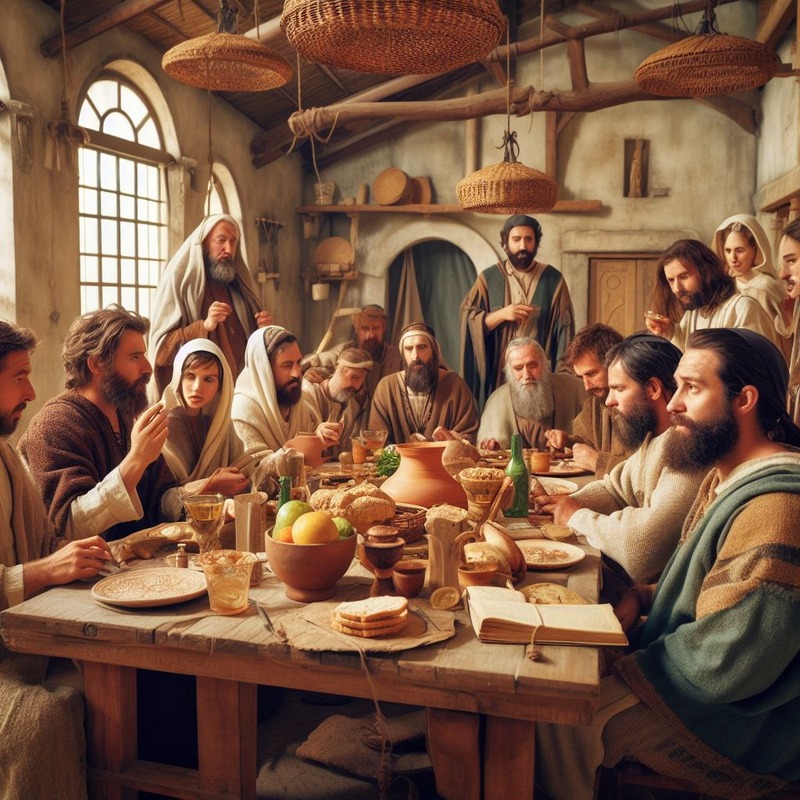Shared Meals
- Details
- Category: Practice the Kingdom

The disciples of Jesus, as instructed by him, not only preach the anti-imperial Kingdom of God, but also start practicing its principles of operation in their community. Luke documents this in his Book of Acts in two sections – Acts 2:42-47 and 4:32-35. Let us take a peek into how this alternative society operates.
As he preached the upcoming Kingdom of God in the wilderness, Jesus put Yahweh’s Manna Principle into action when a great multitude was in hunger and showed his disciples the exponential power of sharing with each other. As they follow his footsteps in proclaiming the Kingdom of God, the disciples become known for their common Christian meals where they break bread together during their fellowship.
They devoted themselves to the apostles’ teaching and fellowship, to the breaking of bread and the prayers... Day by day, as they spent much time together in the temple, they broke bread at home and ate their food with glad and generous hearts, praising God and having the goodwill of all the people.
Acts 2:42,46-47
While the Empire hoards food and uses it as leverage to exploit the people, this community takes a different approach, and breaks bread and shares wine together. And these are actual courses of meals, which would later be turned into a nominal ritual by organized religion. These common meals are recorded as a habitual occurrence even in Paul’s activities (Acts 20:7,11).
When the Corinthian church fractures along social and economic lines and that division manifests in their common meals, Paul writes them a strongly worded letter –
Now in the following instructions I do not commend you, because when you come together it is not for the better but for the worse. For, to begin with, when you come together as a church, I hear that there are divisions among you; and to some extent I believe it. Indeed, there have to be factions among you, for only so will it become clear who among you are genuine. When you come together, it is not really to eat the Lord’s supper. For when the time comes to eat, each of you goes ahead with your own supper, and one goes hungry and another becomes drunk.
1 Corinthians 11:17-21
He is furious that those who have the means for food in the church have gone ahead to have a meal while the poor among them have gone hungry. He continues further -
What! Do you not have homes to eat and drink in? Or do you show contempt for the church of God and humiliate those who have nothing? What should I say to you? Should I commend you? In this matter I do not commend you!
1 Corinthians 11:22
It is obvious whom he’s addressing in this passage – those who are rich enough to own homes. He is rebuking the “haves” among the church for humiliating the “have-nots”. He goes on to remind them that it was Jesus himself who instituted this meal to be shared among his followers in remembrance of him (1 Cor 11:23-24).
He points out that the cup of wine they share, symbolizes the new covenant that began with Christ's own blood (1 Cor 11:25), in the lines of the original covenant on Mount Sinai in which Yahweh and his people had also been bound by blood (Exodus 24:8). For this reason, he implores them to take this shared meal seriously. “Not sharing” it with those less fortunate among them would obviously mean not taking it seriously, essentially making them “unworthy”.
Whoever, therefore, eats the bread or drinks the cup of the Lord in an unworthy manner will be answerable for the body and blood of the Lord. Examine yourselves, and only then eat of the bread and drink of the cup.
1 Corinthians 11:27-28
And because of such unworthy behavior, the Corinthian church as a “body” is bringing judgment against herself.
For all who eat and drink without discerning the body, eat and drink judgment against themselves. For this reason many of you are weak and ill, and some have died.
1 Corinthians 11:29-30
The poor among them have become sick and died because the church members have not cared for them as they should have.
Paul goes on to advise them to correct themselves.
But if we judged ourselves, we would not be judged. But when we are judged by the Lord, we are disciplined so that we may not be condemned along with the world.
1 Corinthians 11:31-32
It’s clear that Jesus does not want his followers to operate like the world does. He expects them to share and care for each other. If they do not do so, they become unworthy and end up suffering like the rest of the world does under the imperial system.
Read Next: Shared Possessions
